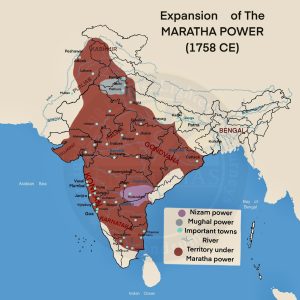Maratha Kingdom
- The Marathas, spearheaded by Chhatrapati Shivaji Maharaj, emerged as a prominent force in India during the late 17th century.

Origins of the Marathas
- The Marathas originated in the Deccan Plateau, primarily in present-day Maharashtra.
- Their early history was rooted in local warrior clans who served regional rulers like the Deccan Sultanates.
- The rise of the Marathas as an independent power began under Chhatrapati Shivaji Maharaj in the 17th century.
Chhatrapati Shivaji Maharaj
- He was the founder of the Maratha Empire
- Shivaji established a strong and centralized administration with Raigad as his capital.
- Known for his military strategies, particularly guerrilla warfare or “Ganimi Kava”.
- Successfully resisted the Mughal Empire and other adversaries like the Bijapur Sultanate.
- Introduced reforms in revenue systems and administration, ensuring welfare for peasants and stability in governance.
- His council of ministers was famously known as the Ashtapradhan and included Peshwas (Prime Minister), Amatyas (Finance Minister), Panditrao (High Priest) and others.
Expansion of the Maratha Empire
- After Shivaji’s death in 1680, his successors, including Sambhaji, continued to expand Maratha influence.
- The Marathas clashed with Aurangzeb during his Deccan campaigns but resisted his efforts to subjugate them.
- By the early 18th century, leaders like Peshwa Baji Rao I extended Maratha power across India, controlling large territories.
Administrative and Military Strength
- Adopted a decentralized system of governance with autonomous regional chiefs (sardars).
- Efficient tax collection system, notably the Chauth (25% tax on revenues) and Sardeshmukhi (additional 10% tax).
- Their cavalry was the backbone of their military, known for swift and strategic operations.
Role in the Decline of the Mughal Empire
- The Marathas were instrumental in challenging the Mughal Empire during its decline.
- They emerged as the dominant power in the 18th century, filling the vacuum left by the weakening Mughal authority.
- Played a key role in defending India against foreign invasions, such as Ahmad Shah Durrani’s attacks.
Legacy of the Marathas
- The Marathas laid the foundation for future Indian resistance against colonial powers.
- Inspired local resistance against foreign dominance, making them significant in Indian history.
- Despite their decline after the Third Battle of Panipat (1761) and British annexation, their influence shaped the political and cultural identity of India.
